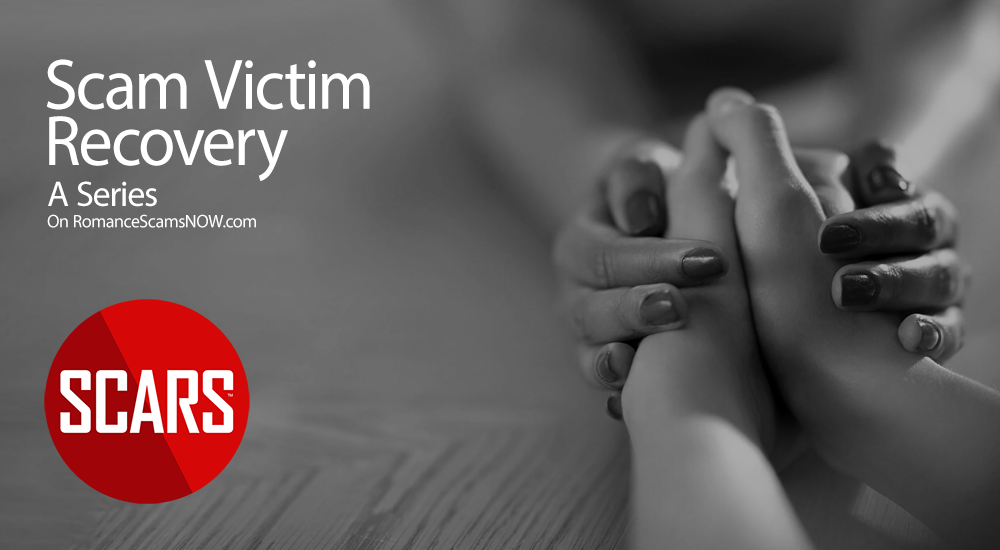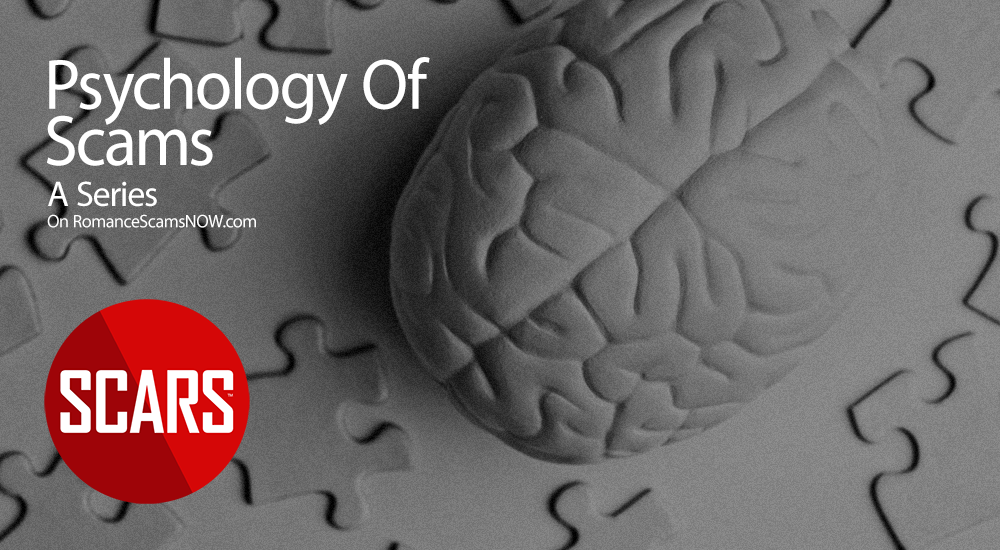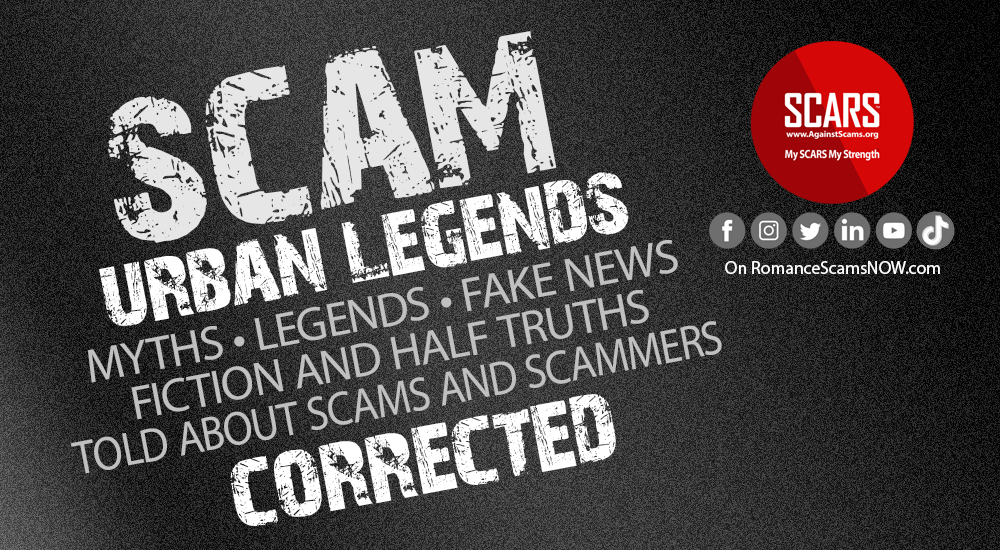
SCARS Institute’s Encyclopedia of Scams™ Published Continuously for 25 Years

Why Do Victims Want To Believe They Were Hypnotized Or Bewitched?
Because It Can Be More Comforting Than The Alternatives
A peculiar aspect of victim psychology after the scam is the desire to push away the guilt and blame by looking for fantastical explanations for what happened. Since almost all victims do not really know why they were scammed, urban legends and fantastical reasons can be more comforting than believing they were at fault.
Almost all victims feel shame, guilt, and substantial self-blame for “allowing” the scam to happen. However, this is both unnecessary and simply wrong since victims are not to blame for their scams.
Victims cannot understand why they would have allowed a criminal to control them so completely, so there must be a supernatural explanation. They must have been bewitched or under hypnosis.
Unfortunately, very few victims even understand what these things really mean! So, they get swept up in concepts that sound good and help them feel blameless.
The Fact Is That Victims Were Expertly Manipulated And Controlled
The fact is that victims are groomed, manipulated, and controlled by professional criminals to such an extent that they are relatively powerless. They are manipulated into doing what the scammer wants.
Some victims break free of this control and end their scam before losing money, but many (most?) do not. They are so controlled by these professional criminals that they do what is wanted.
Victims Are Not Experts!
Unfortunately, victims have a very bad habit after the scam ends – believing that they know more than they do (a common cognitive bias). Not only about scams and scammers, but also about psychology and trauma. This often turns into grabbing onto urban legends and false information because it “feels” right.
We have had victims who are psychologists or psychiatric nurses become victims and even they did not fully understand the mechanisms of manipulation or their own susceptibilities until it was explained to them.
In one way it is natural and understandable.
Victims are looking for ways to mitigate their guilt and shame, so anything that could easily explain why they behaved the way they did helps, even if it is completely wrong.
The problem is that because they do not understand these topics they latch onto urban legends and false information, in essence, more fairy tales and fantasy. This makes it much harder for them to recover, and resolve their trauma and other psychological issues that need to be resolved.
THREE MAIN URBAN LEGENDS
Let’s look at some of the fantasies that scam victims commonly grab onto after their scam ends.
1. JuJu, Witchcraft, and VooDoo
It is a fact that West Africans have many different belief systems. Sakawa or Yahoo cultists use various forms of witchery in their practices. These are religious beliefs. Scammers are also Christians and Muslims too. Regardless, they are using religion to both self-justify the crimes they commit and (they believe) to help them in securing money. All such belief systems are fairy tales. Maybe not the base religion, but certainly the notion that it helps them control victims and get more money.
What is worse though is that victims themselves often believe this nonsense and even spread these urban legends to other victims. This is why amateur anti-scam groups are so dangerous.
No scam victim has ever been affected by JuJu, Witchcraft, or Voodoo. We have helped nearly 8 million scam victims and not one was ever the victim of this, though many believed it. No mystical explanations are needed. Manipulation works just fine and is very effective. Any victim that believes otherwise is in denial of their true trauma and may have other psychological disorders.
2. Hypnosis
Once again, victims do not understand what these terms even mean or are. Hypnosis has very limited application and there are no legitimate studies showing that it can make a person do anything they do not want to. PERIOD!
While you will find plenty of inaccurate or completely false information about this online, here is what hypnosis really is:
Real psychologists know that hypnosis is not some special altered state of consciousness, but simply a form of deep relaxation.
Stage hypnosis – such as the kind seen in Las Vegas comedy acts where “suggestible” audience members get on stage and pretend to be chickens or caught in embarrassing situations – is not true clinical hypnosis but instead a combination of showmanship and participatory comedy. People act like chickens because they want to be the center of attention and simply go along with the show.
There is evidence that hypnosis might be useful in addressing some behavior-related medical issues such as quitting smoking or weight loss – but in these cases the patient wants to quit or lose weight already, so it is only aiding them in reducing their own resistance to something they already want.
There may be a placebo-like effect in that a person who is highly motivated to change their habits might get a boost from believing that hypnosis is helping them. However the evidence is weak because people who seek out hypnosis for help with their problems are by definition highly motivated, and any added success rate may be due to that motivation, with or without the benefit of hypnosis.
It’s not clear why a person would believe or assume that he or she had been put into a hypnotic trance when they had not. Such a belief may be due to memory loss or confusion, trauma or psychosis, or other psychological issues, but there’s no reason to fear hypnotist scammers.
Hypnosis can serve to help someone do what they want to by putting them in a more relaxed state, but all claims about its ability to control people and force them to do someone else’s will is fantastical thinking – in other words, more fairy tales.
Where hypnosis may apply in a scam is with autohypnosis or self-hypnosis. Victims want so much to believe in the fantasy relationship that they actually could reinforce their belief in the fantasy by auto-suggestion. Though this still is an effect of the manipulation.
Also, as a part of manipulative techniques, a victim can be placed into more relaxed states through a combination of techniques that can include suggestion, but it is not the cause of the victim’s behavior.
Manipulation and human susceptibility are the real causes of all victims’ behaviors during the scam, along with the victim’s own psychology. No victim is to blame for this.
3. Brainwashing
Brainwashing is a real thing, but there is no evidence that it can be done without physical control or contact with the person – the victim. In other words, you can’t do it by text, chat, or a few rare phone calls.
Brainwashing is distinctly different from other forms of temporary manipulation and control, in that it changes the victim’s belief system permanently (long term). This is why it is seen so often in religious cults.
An example of a technique used in both scammer manipulation and in brainwashing is Gaslighting – when done in person over an extended period of time, it can be considered brainwashing. The victim is permanently programmed by the brainwasher. This is one of the reasons why domestic abuse victims are so profoundly controlled and have such difficulty recovering. They have to be reprogrammed. The same with cult victims, and there is a specialized branch of psychology for dealing with these.
But in the case of scam victims, the scammer does not have psychical control over the victim 24/7. They do use manipulation that can be almost as powerful, but that control is typically very temporary and can be easily broken in many ways if the scammer is not careful.
This is not to say that victims are not profoundly traumatized by the experience, and sometimes it might appear to be brainwashing, but it is not. Most often when victims appear to be more deeply affected then trauma or other psychological disorders easily explain their situation.
DON’T LOOK FOR FAIRY TALES
Victims of relationship scams are expertly manipulated and for that reason are not to blame. The human mind is wired to be susceptible and controllable. We do not need to go looking for reasons that are not real.
In the period immediately after the scam, most victims are in a state of shock and panic and looking for answers. Often, they find them in amateur anti-scam hate groups that have no idea what they are doing or even what information is real.
They spread urban legends and nonsense information believing in their own authority. This causes considerable harm to victims, which then requires professional support and counseling to overcome.
Every scam victim should find a local trauma counselor and a professional support organization to help them from the beginning – though it is never too late. They should avoid anyone that spreads false information, urban legends, and fairy tales.
IF YOU BELIEVE?
If you really believe that you were bewitched or hypnotized or brainwashed, then we suggest that you find a local trauma counselor or therapist to be evaluated.
Belief in these urban legends, even after it has been explained, may be a sign of something deeper that may need help to be sorted out. We are not saying you are crazy, just that you are a human being that needs help.
REMEMBER!
Scams happen because we are human and our brains are hard-wired to be deceived.
Everyone is susceptible to deception – there is nothing supernational about it.
Scammers use powered techniques to lure, groom, manipulate, and control their victims. This does considerable psychological damage along the way!
You are not to blame – pure and simple.
There is no reason to feel shame and guilt.
Especially, do not let your desperation for answers lead you to urban legends and fairy tales, and to fake experts that tell you otherwise.
If you believe them you are once again believing in another scam, another fantasy.
Get real help and you will be able to recover from this experience. Follow the wrong path and you may never fully recover.
-/ 30 /-
What do you think about this?
Please share your thoughts in a comment below!
Table of Contents
- The Psychology of Scams
- Why Do Victims Want To Believe They Were Hypnotized Or Bewitched?
- Because It Can Be More Comforting Than The Alternatives
- The Fact Is That Victims Were Expertly Manipulated And Controlled
- Victims Are Not Experts!
- THREE MAIN URBAN LEGENDS
- 1. JuJu, Witchcraft, and VooDoo
- 2. Hypnosis
- 3. Brainwashing
- DON’T LOOK FOR FAIRY TALES
- IF YOU BELIEVE?
- REMEMBER!
LEAVE A COMMENT?
Thank you for your comment. You may receive an email to follow up. We never share your data with marketers.
Recent Comments
On Other Articles
- on Love Bombing And How Romance Scam Victims Are Forced To Feel: “I was love bombed to the point that I would do just about anything for the scammer(s). I was told…” Feb 11, 14:24
- on Dani Daniels (Kira Lee Orsag): Another Scammer’s Favorite: “You provide a valuable service! I wish more people knew about it!” Feb 10, 15:05
- on Danielle Delaunay/Danielle Genevieve – Stolen Identity/Stolen Photos – Impersonation Victim UPDATED 2024: “We highly recommend that you simply turn away form the scam and scammers, and focus on the development of a…” Feb 4, 19:47
- on The Art Of Deception: The Fundamental Principals Of Successful Deceptions – 2024: “I experienced many of the deceptive tactics that romance scammers use. I was told various stories of hardship and why…” Feb 4, 15:27
- on Danielle Delaunay/Danielle Genevieve – Stolen Identity/Stolen Photos – Impersonation Victim UPDATED 2024: “Yes, I’m in that exact situation also. “Danielle” has seriously scammed me for 3 years now. “She” (he) doesn’t know…” Feb 4, 14:58
- on An Essay on Justice and Money Recovery – 2026: “you are so right I accidentally clicked on online justice I signed an agreement for 12k upfront but cd only…” Feb 3, 08:16
- on The SCARS Institute Top 50 Celebrity Impersonation Scams – 2025: “Quora has had visits from scammers pretending to be Keanu Reeves and Paul McCartney in 2025 and 2026.” Jan 27, 17:45
- on Scam Victims Should Limit Their Exposure To Scam News & Scammer Photos: “I used to look at scammers photos all the time; however, I don’t feel the need to do it anymore.…” Jan 26, 23:19
- on After A Scam, No One Can Tell You How You Will React: “This article was very informative, my scams happened 5 years ago; however, l do remember several of those emotions and/or…” Jan 23, 17:17
- on Situational Awareness and How Trauma Makes Scam Victims Less Safe – 2024: “I need to be more observant and I am practicing situational awareness. I’m saving this article to remind me of…” Jan 21, 22:55
ARTICLE META
Important Information for New Scam Victims
- Please visit www.ScamVictimsSupport.org – a SCARS Website for New Scam Victims & Sextortion Victims
- Enroll in FREE SCARS Scam Survivor’s School now at www.SCARSeducation.org
- Please visit www.ScamPsychology.org – to more fully understand the psychological concepts involved in scams and scam victim recovery
If you are looking for local trauma counselors please visit counseling.AgainstScams.org or join SCARS for our counseling/therapy benefit: membership.AgainstScams.org
If you need to speak with someone now, you can dial 988 or find phone numbers for crisis hotlines all around the world here: www.opencounseling.com/suicide-hotlines
A Note About Labeling!
We often use the term ‘scam victim’ in our articles, but this is a convenience to help those searching for information in search engines like Google. It is just a convenience and has no deeper meaning. If you have come through such an experience, YOU are a Survivor! It was not your fault. You are not alone! Axios!
A Question of Trust
At the SCARS Institute, we invite you to do your own research on the topics we speak about and publish, Our team investigates the subject being discussed, especially when it comes to understanding the scam victims-survivors experience. You can do Google searches but in many cases, you will have to wade through scientific papers and studies. However, remember that biases and perspectives matter and influence the outcome. Regardless, we encourage you to explore these topics as thoroughly as you can for your own awareness.
Statement About Victim Blaming
SCARS Institute articles examine different aspects of the scam victim experience, as well as those who may have been secondary victims. This work focuses on understanding victimization through the science of victimology, including common psychological and behavioral responses. The purpose is to help victims and survivors understand why these crimes occurred, reduce shame and self-blame, strengthen recovery programs and victim opportunities, and lower the risk of future victimization.
At times, these discussions may sound uncomfortable, overwhelming, or may be mistaken for blame. They are not. Scam victims are never blamed. Our goal is to explain the mechanisms of deception and the human responses that scammers exploit, and the processes that occur after the scam ends, so victims can better understand what happened to them and why it felt convincing at the time, and what the path looks like going forward.
Articles that address the psychology, neurology, physiology, and other characteristics of scams and the victim experience recognize that all people share cognitive and emotional traits that can be manipulated under the right conditions. These characteristics are not flaws. They are normal human functions that criminals deliberately exploit. Victims typically have little awareness of these mechanisms while a scam is unfolding and a very limited ability to control them. Awareness often comes only after the harm has occurred.
By explaining these processes, these articles help victims make sense of their experiences, understand common post-scam reactions, and identify ways to protect themselves moving forward. This knowledge supports recovery by replacing confusion and self-blame with clarity, context, and self-compassion.
Additional educational material on these topics is available at ScamPsychology.org – ScamsNOW.com and other SCARS Institute websites.
Psychology Disclaimer:
All articles about psychology and the human brain on this website are for information & education only
The information provided in this article is intended for educational and self-help purposes only and should not be construed as a substitute for professional therapy or counseling.
While any self-help techniques outlined herein may be beneficial for scam victims seeking to recover from their experience and move towards recovery, it is important to consult with a qualified mental health professional before initiating any course of action. Each individual’s experience and needs are unique, and what works for one person may not be suitable for another.
Additionally, any approach may not be appropriate for individuals with certain pre-existing mental health conditions or trauma histories. It is advisable to seek guidance from a licensed therapist or counselor who can provide personalized support, guidance, and treatment tailored to your specific needs.
If you are experiencing significant distress or emotional difficulties related to a scam or other traumatic event, please consult your doctor or mental health provider for appropriate care and support.
Also read our SCARS Institute Statement about Professional Care for Scam Victims – click here to go to our ScamsNOW.com website.
















There was nothing supernatural about my scam or the money I lost. This article does a great job especially at the end about accepting reality.